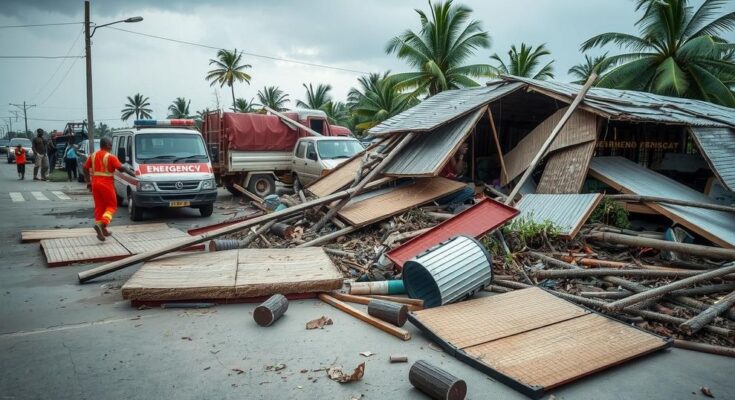Cyclone Chido has claimed 94 lives in Mozambique and 13 in Malawi, affecting over 622,000 people. Winds reached 260 km/h, damaging 140,000 homes and numerous public facilities. The cyclone struck Mozambique on December 15 after impacting Mayotte on December 14.
The recent devastation caused by Cyclone Chido has tragically resulted in 94 fatalities in Mozambique, as reported by the National Institute for Disaster Risk Management and Reduction (INGD). The cyclone, which struck the Indian Ocean coast on December 15, reached wind speeds of 260 kilometers (161.5 miles) per hour. The disaster has also resulted in 768 injuries and has adversely affected approximately 622,000 individuals, damaging around 140,000 homes, 52 health facilities, 89 public structures, and 250 educational institutions. Meanwhile, neighboring Malawi has reported 13 deaths and over 35,000 affected individuals since the storm’s arrival, with many more injured. The cyclone initially impacted Mayotte on December 14 before proceeding to Mozambique and Malawi, instigating extensive destruction throughout the region.
Cyclone Chido has emerged as one of the significant natural disasters to affect southeastern Africa recently, illustrating the severe impact of climate change on vulnerable coastal regions. With significant wind speeds, this cyclone not only caused loss of life but also disrupted essential services and infrastructure across multiple countries. The extent of its impact in Mozambique and Malawi underscores the pressing need for disaster preparedness and responsive measures to mitigate future disasters in climatically vulnerable areas.
The tragedy of Cyclone Chido highlights the dire consequences of natural disasters exacerbated by climate change, resulting in substantial loss of life and destruction of infrastructure. This event serves as a crucial reminder of the vulnerabilities faced by regions such as southeastern Africa, necessitating comprehensive disaster management strategies. The devastating human impact calls for increased international humanitarian support and attention to climate resilience initiatives.
Original Source: www.aa.com.tr




